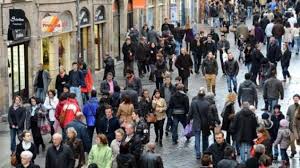France is undoubtedly the country that attracts the largest number of Moroccan nationals living abroad with available statistics suggesting that 1.25 million of them live there, ‘Aujoud’hui Maroc’ newspaper reports.
According to the newspaper, the migration of Moroccans to France has undergone major changes. In 1974, this largely motivated by economic reasons.
It now represents only 10 percent of the structure of Moroccan migrants in France, the newspaper says.
The family reunion movement emerged a year later and lasted until 1984.
This period was marked by the arrival of 147,932 Moroccan wives and their children on French soil, to join their spouses.
More than half of Moroccans residing in France are women (52 percent).
However, social aspects, such as marriage, are not enough to analyze the socio-demographic situation of this category of Moroccans Residing Abroad (MRE).
French statistics show that 3,879 Moroccan women with a higher education level have chosen to stay in France.
There is also a strong migration of Moroccan students.
In 2016 for instance, 22,913 students chose to continue their studies in France, accounting for 44 percent of all expatriate scholarships.
But despite stringent naturalization measures imposed by the French state, 38,000 Moroccans have been able to acquire French nationality in recent years.
The number of Moroccans residing in Germany is 180,000.
Their ages range from 20 to 45 years, with an average of 3 children per family.
According to 2016 statistics, 12,950 Moroccans have settled in Germany.
The same statistics show that 22 percent of Moroccans in Germany have a basic education degree, while 14 percent have attended secondary school.
Besides, another 36 percent are graduates, while 27 percent have no degree.
Moreover, the number of Moroccans naturalized in Germany continues to grow.
At the end of 2017, 115,000 Moroccans were granted citizenship.
The migration of Moroccans to Spain is recent, compared to other European countries.
880,000 Moroccans, representing 15 percent of the total foreign communities, reside in Spain.
In 2018, 220,000 Moroccans were naturalized, against 11,000 in 1990.
In the Spanish labor market, 103,000 Moroccans work in services, compared with 73,000 in agriculture.
Similarly, 36 percent of Moroccans in Spain work in the industrial and construction sectors.
Belgium hosts 700,000 Moroccans, including 460,000 naturalized.
About 20 percent of young Moroccans residing in Belgium have a higher diploma.
It also shows that Moroccans hold interesting positions in Belgian society.
300 medical doctors and 350 engineers work in different fields.
Moroccans in Belgium are also well represented in the country’s institutional bodies.
There are 30 parliamentarians (men and women) of Moroccan origin, as well as nine federal parliamentarians, including three in the Wallonia region, 15 in Brussels and three in the Flemish region.
There are also 100 elected representatives in local councils, two mayors of cities and 20 vice-mayors.
Also 120,000 individual enterprises and 20,000 TPEs are run by Moroccans.
HA/fss/as/APA


